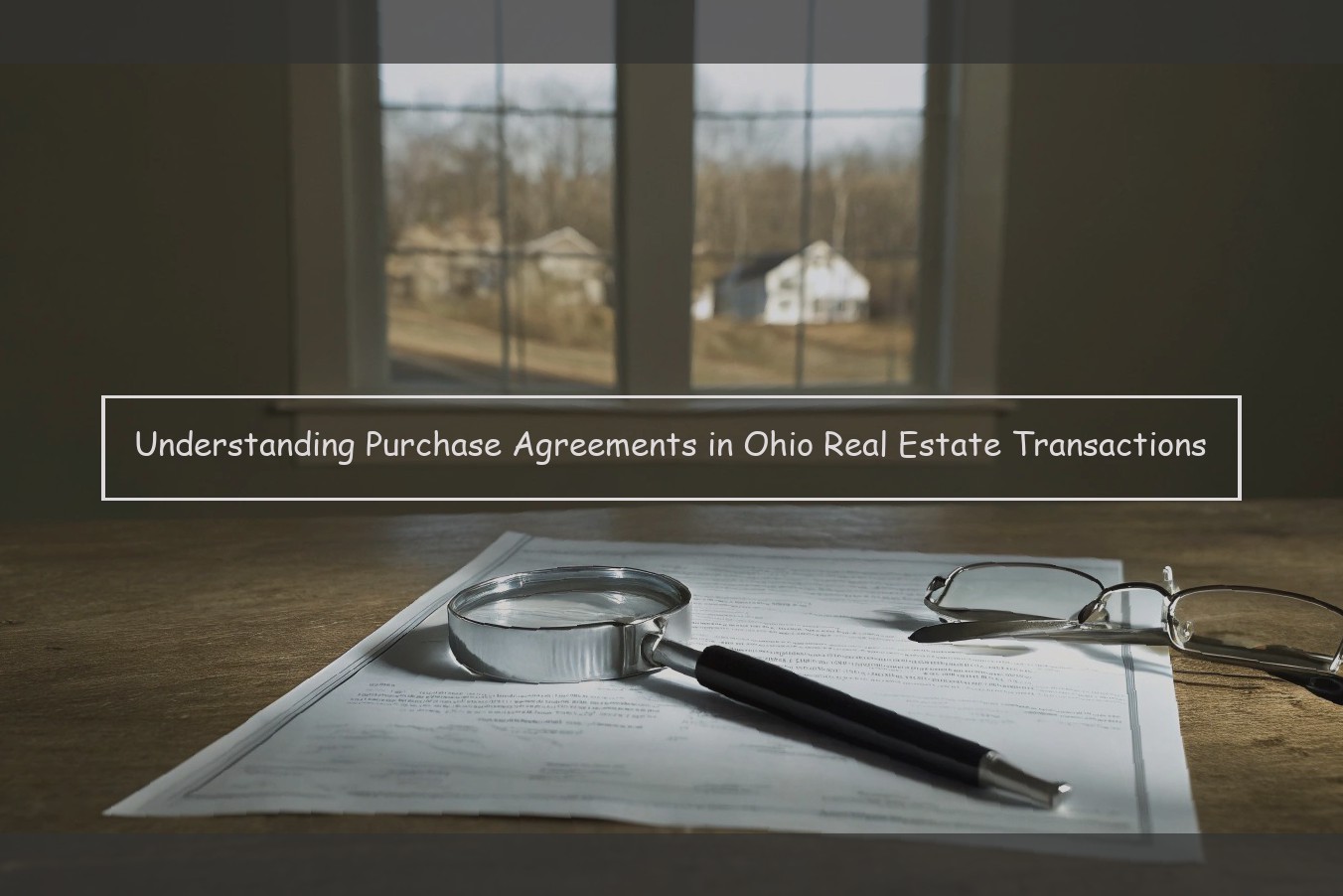What is a Real Estate Purchase Agreement
In Ohio,besides the deed, a real estate purchase agreement is one of the most important documents in a real estate transaction. Think of a real estate purchase agreement as the foundation of a home. The purchase agreement is the basis for everything else that will happen in a real estate transaction.
Offer and Acceptance: A purchase agreement gives the buyer the right to buy the property at the negotiated price (offer). A purchase agreement obligates a seller to sell the property to a buyer at the negotiated price (acceptance).
Duty to Convey: A purchase agreement creates a duty for the seller to convey (transfer) ownership of the property to the buyer. A seller has an obligation to deliver a good and marketable fee simple title to the property.
Cases may be lost or won over the language used in a real estate purchase agreement. In Ohio, the courts use the plain meaning rule in interpreting real estate purchase agreements. Regardless of the sophistication of the buyer and seller or their respective agents, the court looks at what the purchased agreement says. Contracts, including real estate purchase agreements, are given their ordinary and common meaning.
The purchase agreement sets the terms and conditions of the deal for the parties . Without the framework of a purchase agreement, the parties do not have assurance they are in agreement on all of the issues involved in the transaction. It would be an invitation for disappointment if a seller was unaware of the terms under which he or she was agreeing to sell property. It would be an invitation for disappointment if a buyer was unaware of the terms under which he or she was agreeing to buy property.
In Ohio, a real estate purchase agreement is not enforceable unless it is in writing, signed and specifies the property, the parties and the purchase price. If these elements are missing, the contract is not enforceable. There are few exceptions to the writing requirement.
In Ohio, a real estate purchase agreement is not a deed. In Ohio, a deed conveys title to the buyer. The deed is signed by the buyer as grantor and by the seller as grantee. In Ohio, a deed must be acknowledged by the grantor, must be witnessed by two witnesses and must be recorded with the county recorder to provide notice to the world of the buyer’s ownership of the property.
A deed conveys title to the property. Some purchase agreements must be supported by a deed.
Real estate purchase agreements. They bind the buyer and seller to the terms and conditions of a deal on real property in Ohio.

Important Elements of a Purchase Agreement in Ohio
Key Components of Ohio Purchase Agreements include the following:
Property Description – In these matters, there is a description of the property which should always be carefully reviewed to confirm that it includes the specific property you are interested in (if not, an addendum can be applied). If you are interested in a commercial or industrial building or complex, it should also include a description of the buildings, the fixtures, and the portion of the land the buyer will be receiving if the seller intends to retain some of the property.
Purchase Price – the purchase price should also be included in the agreement (if this sounds basic, the buyer’s deposit can only be returned once the seller has obtained it or if certain terms are not to happen such as a contingency where the buyer could back out). Again, be very clear with your offer to obtain the property to avoid a misunderstanding with the seller over price. In addition, the agreement should include the conditions under which the deposit will be held by a third (independent) party such as a law firm.
Closing – typically, the closing will take place upon receipt of a clear title or Ohio abstract on the title of the property which essentially means that the real estate transfer has been cleared of any liens, restrictions or other encumbrances. The agreement should also detail all of the details regarding the closing requirements including: closing costs for a bank loan (which are typically between 3.0% -4.5%), payment terms, closing costs to be covered by each party, any down payments as well as specifying the deal breaker item (specific points where the buyer will be able to cancel the deal without a cost). There should also be additional provisions for resolving issues that may arise after the closing.
Legal Requirements for an Ohio Purchase Agreement
In Ohio, the legal requirements to form a real estate purchase agreement are governed by state law and the terms set forth by local municipalities. It is important that all parties understand and comply with these requirements to avoid any potential disputes after purchasing a property.
In Ohio, all real estate purchase agreements must contain the essential elements of a valid contract. The parties must be capable of entering a contract, the subject matter must be clearly identified and labeled in writing, the consideration must be set forth, and the terms of the agreement must be clear and consistent. General specifications for legal contracts apply, and the purchase agreement must meet the standard for enforceability provided by the Ohio Revised Code.
Ohio also requires the inclusion of certain disclosures. This includes a disclosure concerning lead-based paint that is applicable to purchasing properties that were built before 1978. An addendum must include the background of the property including the known presence of lead-based hazards, the testing conducted by the previous owner, and information on the type of hazard. This protects the buyer from potential exposures of lead from old painted surfaces and damaged plumbing. It is not unique to Ohio, but it is required to comply with federal law. Sellers should provide a booklet, "Protect Your Family from Lead in Your Home," and additional pamphlets to the buyer, as well. The buyer should confirm that the seller provided these materials.
Sellers must also provide information regarding information on radon levels of the property if available, whether the property is located in a Special Flood Hazard Area, and local ordinances on point-of-sale programs. While a point-of-sale program is not required by Ohio law, when one exists, sellers must check to ensure compliance with the program and obtain a certificate of compliance before selling the property. While these notices are not industry-standard, they must be adhered to when required by state law.
Typical Contingencies in Ohio Purchase Agreements
In Ohio, as in most States across the Country real estate purchase agreements are governed by a set of implied warranties and contingencies. When perfecting a real estate transaction, buyers, sellers, and lenders are all impacted by these contingencies and sometimes even play a part in creating them.
The following is a short list of common contingencies and in general terms how they impact Ohio real estate transactions:
Financing: This type of contingency gives the purchaser a right and basis to walk away from the transaction without penalty if they are unable to obtain financing. Obtaining financing for the purchase of a real estate property, regardless of it being residential or commercial can be difficult. So therefore, it is important for the purchaser to include this contingency. Oftentimes this type of contingency will also require that the lender send a letter to the seller stating that the buyer is qualified and pre-approved for financing.
Inspections: During the period prior to the closing of a sale it is important to have the property inspected. Depending on the property and particular transaction, an inspection will be for hazardous materials, lead, termites, or simply for the buyer to inspect the property for at least one time. Almost any property acquisition will be subject to an inspection contingency.
Appraisal Problems: If the appraisal of the property comes back less than the agreed upon price, the lender may not approve the loan. This contingency allows the purchaser to either cancel the purchase or negotiate down the price of the property.
How to Draft a Real Estate Purchase Agreement in Ohio
Steps for Drafting a Purchase Agreement in Ohio
When drafting a purchase agreement in Ohio, the buyer and seller will often have guidance from their realtors. Real estate purchase agreements in Ohio often utilize an "as-is" provision, meaning that the seller isn’t responsible for closing costs and the buyer must conduct its due diligence prior to executing the purchase agreement. Some purchase agreements also include a deposit provision that requires a refundable deposit, such as $1,000.00, to be placed with a real estate broker as security for the purchaser’s performance. If the transaction closes, the deposit becomes part of the purchase price. However, if the purchaser fails to close for any reason other than specific "conditions to closing," the seller may retain the deposit as liquidated damages. In addition to the form purchase and sale agreement, Ohio law requires a Residential Property Disclosure be provided by the seller of residential property and followed by an Ohio Commercial Property Disclosure Form if a property is at least four (4) dwelling units in size and not regulated by the Ohio Department of Development , or if a property is unoccupied commercial real estate with any building or structure on the property. These forms are provided to the purchaser of real estate by the seller or the seller’s realtor to assist the purchaser in making its decision to enter into a purchase agreement. These forms include information about any defects and past issues with the property and direct the purchaser to the seller’s and lender’s records to review for additional information. Information on the Residential Property Disclosure for single-family dwellings is located in Section 5302.30(B) of the Ohio Revised Code. Information on the Commercial Property Disclosure for commercial real estate policy is located in Section 5302.30(A) of the Ohio Revised Code. If you are selling or purchasing real estate in Ohio, it is advisable to seek advice from your attorney when entering a purchase agreement. Particularly for larger purchase transactions, an attorney can draft the necessary purchase agreement to fit the buyer and seller’s needs and advise as to any appropriate contingencies to include in the contract.
Common Pitfalls to Avoid
It may be the most exciting day or simply the worst day for you to find a mistake in a real estate purchase agreement. You have finally found the perfect home (or commercial property) and after your negotiations you are on your way to finalizing the purchase. The excitement has started to build and then someone points out a mistake in the Purchase and Sale Agreement or rider. It could be a simple misspelling, or it could be an inversion of a number from what you said to what was written. It may be the wrong address or even the name of the wrong buyer or seller. Obviously, these mistakes can easily be fixed in the negotiation period, but rolling the dice by not figuring it out until the closing table makes for an intense nail biter whether you are the buyer or the seller.
Even with experienced real estate attorneys on each side of the transaction, there may still be issues that pop up while reviewing real estate purchase agreements. Here are a few tips to help you avoid common mistakes: Make Sure Both Sides Are Clear For some real estate deals, the process moves so fast that details can fall through the cracks. Crafting a detailed real estate purchase agreement can help avoid those bumps in the road along the way. Drafting the agreement with a skilled real estate attorney will help you avoid problems later on if there are actual problems. Read the Agreement Thoroughly When the Contract or Purchase and Sale Agreement is drafted by either your attorney or the seller’s attorney, always have your attorney review the contract thoroughly. This will help you avoid common mistakes and allow you to read the contract not just from a legal perspective but from a consumer perspective. Sometimes that failsafe approach can help you avoid pitfalls that an attorney may not see that you would as the purchaser or the seller of the property. Pay Attention to Details Most of the problems seen with real estate purchase agreements are on the details. Details such as date, time, money, names, and places. Without these details matching what was discussed and negotiated it can mean the difference between "closing" the deal and having major issues down the line. If you are a buyer, double check to make sure your name is on the purchase agreement and of course as the buyer, make sure you are the purchaser. When selling, make sure the contact information is correct and both your name and the name of your spouse is correctly identified. Double Check the Names This is an obvious one, but still important to read over the Agreement multiple times. This means first names and last names. In Ohio, some people have more than one last name, so no matter how well you think you know your counterpart on the other side, make sure their name is spelled correctly on the purchase and sale agreement. There are many other things that can go wrong with a real estate purchase agreement, however these are some of the most common mistakes that both buyers and sellers should keep an eye out for when dealing with real estate property here in Ohio. Be vigilant and make sure that everything goes as planned with an Ohio real estate purchase agreement.
Closing on an Ohio Real Estate Purchase Agreement
Once the parties have reached agreement on all the substantive provisions of the real estate purchase agreement, including price, financing, due diligence and contingencies, along with the entire array of legal and financial issues, it is time to finalize the Agreement. If the parties were in agreement but for the "time of the essence" provision, then this is the time to do this. Allowing the parties’ attorney’s to finalize the deal without a firm deadline is not a good idea. For the seller, an unsigned purchase agreement is dangerous as the title can go to the first buyer. Prior deals with other purchasers can be irrelevant once the first person takes possession and closes. Even a recorded but unsigned deal can be hard to overcome and can block a subsequent buyer.
However, for an investor on a tight time line closing the deal may not make sense if it is going through a lender who will require the deed. It is otherwise possible that the parties want to close and record the deal at a time much later than the signing so that they can satisfy all contingencies but still be ready to close when all are met. They may not want to hire title insurance or pay transfer taxes until it is closing time.
The attorney should then prepare a final purchase agreement for the parties to sign. This will generally set out the deal as written so far. Once this is done, it is time to review and sign the Purchase Agreement. Depending on the deal, the parties may do this all at once or separately. Just like closing, it is bad to do it separately unless you are sure the other party has signed already. Then, the parties simply sign near the bottom and initial the pages that have any changes made . The Agreement should have been run through an index covering the deal to confirm all of the key provisions are in the Agreement. Even after everything is signed, a mistake can be in the recording or document preparation. This is where title insurance comes into play.
There are multiple ways to finalize the deal. Often, the closing agent will sign and record the documents and then transfer the funds between the closing parties. The deed officially transfers title from the seller(s) to the buyer(s) at that time. This does not have to be signed in front of a notary public, however, it may be desirable to do so as in most cases the deed must be recorded following the rules. The only expense usually charged by the closing agency is what they charge for recording by the county. If the buyer is getting an owner’s title insurance policy, that too shall be charged. If however, there were a lot of complex issues that would take time to figure out on the title search, it is possible to not record the deed until all interest has been perfected.
As mentioned above, the written real estate purchase agreement can restate much of the deal as discussed so far. Consider putting a sentence in the Purchase Agreement that the purchase agreement will control if there are conflicts between the Purchase Agreement and the other deals you have made in the past or even if an owner’s title insurance policy contradicts with the Purchase Agreement. While an attorney might say this is not the case, it really is. Buyers have attacked title policies in court when something that was not in the recorded Assurance was in the contract and that issue did not come up during Discovery.



